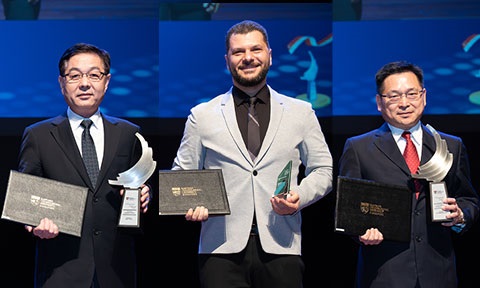2023 IEEE Transactions on Evolutionary Computation Outstanding Paper Award
 Team members (from left): Dr Tan Puay Siew, Dr Abhishek Gupta (Scientist at SIMTech and joint Research Scientist at SCSE), Dr Kavitesh Kumar Bali (PhD scholar from SCSE), Prof Ong Yew-Soon (President’s Chair Professor at SCSE and Chief AI Scientist of A*STAR).
Team members (from left): Dr Tan Puay Siew, Dr Abhishek Gupta (Scientist at SIMTech and joint Research Scientist at SCSE), Dr Kavitesh Kumar Bali (PhD scholar from SCSE), Prof Ong Yew-Soon (President’s Chair Professor at SCSE and Chief AI Scientist of A*STAR).
A scientific paper co-authored by researchers from the SCSE, NTU and SIMTech, A*STAR has been bestowed the prestigious 2023 IEEE Transactions on Evolutionary Computation (TEVC) Outstanding Paper Award. Their article “Multifactorial Evolutionary Algorithm with Online Transfer Parameter Estimation: MFEA-II” was recognized by the IEEE Computationally Intelligence Society as the most outstanding paper published in the IEEE TEVC journal in the year 2020.
With an impact factor of 16.497, IEEE TEVC is considered the top journal of the field of evolutionary computation and is among the premier journals of Computer Science Theory and Artificial Intelligence (AI).
The authors are Dr Kavitesh Kumar Bali (PhD scholar from SCSE), Prof Ong Yew-Soon (President’s Chair Professor at SCSE and Chief AI Scientist of A*STAR), Dr Abhishek Gupta (Scientist at SIMTech and joint Research Scientist at SCSE), and Dr Tan Puay Siew (Research Division Director at SIMTech and Adjunct Associate Professor at SCSE). Their work is the first to establish a theoretical foundation for evolutionary multitasking – a novel idea turning in silico evolutionary algorithms (EAs) into effective multitask optimizers, mimicking nature’s ability to produce diverse species with differently skilled organisms in only a single algorithmic pass. Their article thus marks an important step forward in strengthening our understanding of an emerging subfield of evolutionary computation research. The theory exploits unique characteristics of EAs, opening unprecedented opportunities for data- and compute-efficient optimization search in areas including, but not limited to, out-of-the-box scientific and engineering design generation, real-time manufacturing systems planning, auto configuration of AI and machine learning pipelines, to name just a few.
For more details, please refer to the CIS Awards webpage.














/enri-thumbnails/careeropportunities1f0caf1c-a12d-479c-be7c-3c04e085c617.tmb-mega-menu.jpg?Culture=en&sfvrsn=d7261e3b_1)

/cradle-thumbnails/research-capabilities1516d0ba63aa44f0b4ee77a8c05263b2.tmb-mega-menu.jpg?Culture=en&sfvrsn=1bc94f8_1)

7e6fdc03-9018-4d08-9a98-8a21acbc37ba.tmb-mega-menu.jpg?Culture=en&sfvrsn=7deaf618_1)


a57ab68f-1049-4be2-a83a-d3821af9aeee.tmb-listing.jpg?Culture=en&sfvrsn=e59ee71c_1)
-fellowship63c81756-0d30-4a6c-82e1-80b6dd6927c4.tmb-listing.jpg?Culture=en&sfvrsn=4f8c7bef_1)


